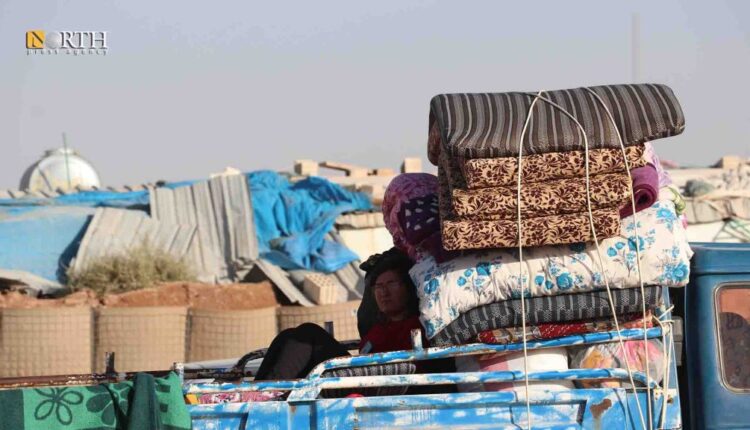
RAQQA, Syria (North Press) – Since Turkey began its first military operation in Syria in August 2016, in Jarabulus, northern Aleppo, Turkish threats to invade the entire Syrian border line with Turkey have not ceased under pretexts of preventing the establishment of a Kurdish state that threatens its national security.
However, political and military leaders in northeast Syria stressed several times that they are part of the Syrian fabric and have nothing to do with the Kurdistan Workers’ Party (PKK), as Turkey claims that Syria’s north is under the influence of the PKK, and repeatedly called for a peace agreement with Turkey.
Nevertheless, in tandem with Turkish threats to launch a new military operation, Syria’s border areas are witnessing constant attacks. The most recent attack was on Tuesday.
In November 2022, Turkish drones targeted 26 locations in northeast Syria, attacking critical infrastructure and facilities such as oil and gas fields.
SDF and PKK
The PKK is one of the fiercest opposing power in Turkey and has been engaged in armed conflict with Turkish forces since 1984, despite peace initiatives, which did not last long. The PKK forces spread over mountains in southern Turkey and some mountains in the Kurdistan Region of Iraq (KRI).
On January 2023, the commander in chief of the Syrian Democratic Forces (SDF), Mazloum Abdi, in an interview with al-Monitor, said that the PKK assisted in the fight against Islamic State (ISIS) but today has no role in the region. He added, “We are not PKK’s branch in Syria. We are separate from them.”
“We are concerned with Syria and the future of all its people. We do not want to be involved or become scapegoats for Turkey’s failure to solve its Kurdish problem. We have already suffered enough, and we do not accept being constantly attacked in this way,” he added at the time.
Saleh Muslem, the co-chair of the Democratic Union Party (PYD), which Turkey accuses of being PKK’s branch in Syria, said, “Turkey’s goal of these attacks in Syria is to eliminate Kurds.”
“Turkey is making up excuses to attack Kurds,” he added.
Turkey further threatened to carry out military action in north Syria after accusing the SDF and the PKK of standing behind the Istanbul bombing on 13 Nov. 2022, which was denied by the two forces.
Muslem commented on the bombing, saying all international powers know that “Turkey is lying and making excuses, but they are unable to stand up and oppose Turkey. Turkey has become a nuisance for everyone.”
International response and Turkish election
Sarkis kassargian, a journalist specializing in Turkish affairs, told North Press that Turkey’s pretexts for a new operation still exist.
He believes that, regional and international states ” will no longer tolerate new wars and chaos as the region heads towards peace and trade deals.”
The international community “is not ready to cover up any new Turkish military risks in north Syria. This is evident in statements of allies of the Autonomous Administration of North and East Syria (AANES) in the west and allies of the Syrian government (Russia and Iran) who disagree on many things but agree in rejecting a new Turkish military operation,” he added.
The journalist speculates that Turkey is no longer able to take any military steps, especially for economic reasons. The SDF also assured that any Turkish military operation would be a costly “fierce war.” However, this does not prevent Turkey from potentially taking small and limited actions to win votes in the elections.
According to the journalist, this is one of the policies on which the Turkish right has been built, saying, “Erdogan is not an exception, but he is more aggressive.”
Erdogan’s win in the elections would mean “the continuation of chaos in the region,” meanwhile if the opposition wins, “it would pave the way for peace and stability,” according to the journalist.
Muslem agrees with Sarkis that Erdogan’s win in the elections will be “catastrophic” not only for northeast Syria but also for Turkey and the world.
Parliamentary and presidential elections are to take place simultaneously on May 14. The elections are seen as the most important in the country in decades, the most difficult for Erdogan since he came to power nearly two decades ago, and the most significant for the opposition, who find themselves closer than ever to ending Erdogan’s rule.
Turkey’s policy remains unchanged
Abdullah al-Asaad, director of Rasd Center for Strategic Studies, says that whether Erdogan or the opposition win in Turkish elections, it will not change Turkey’s policy towards the PKK because it is a threat to Turkish national security.
For the time being, there is no talk of a Turkish operation in northern Syria amid election campaigns of all parties. For now, it is limited to airstrikes against leaders of the PKK and the SDF, he added.
He said that Turkish excuses are always present, which are any threats that compromise Turkey’s national security with or without elections.
The opposition’s victory in the elections could change Turkey’s response to the situation, as one of Turkey’s largest Kurdish parties, the People’s Democratic Party (HDP), is aligned with the opposition and the six-party table, al-Asaad added.
